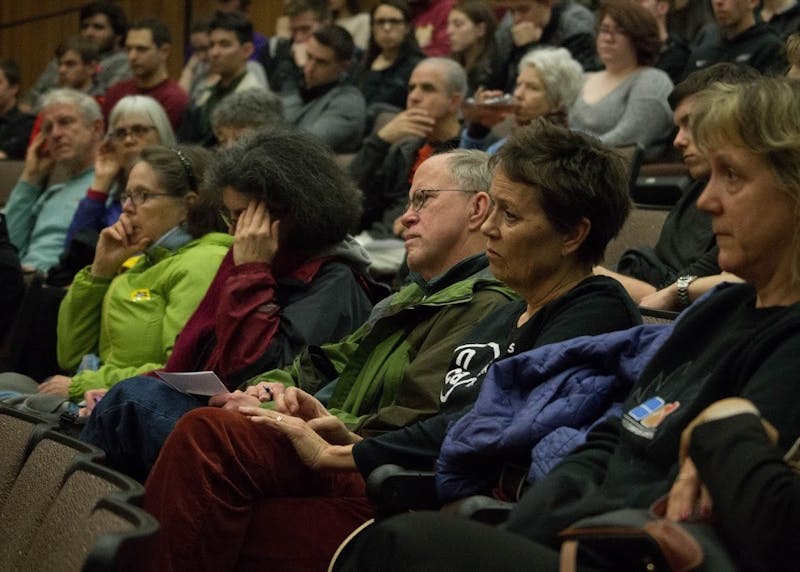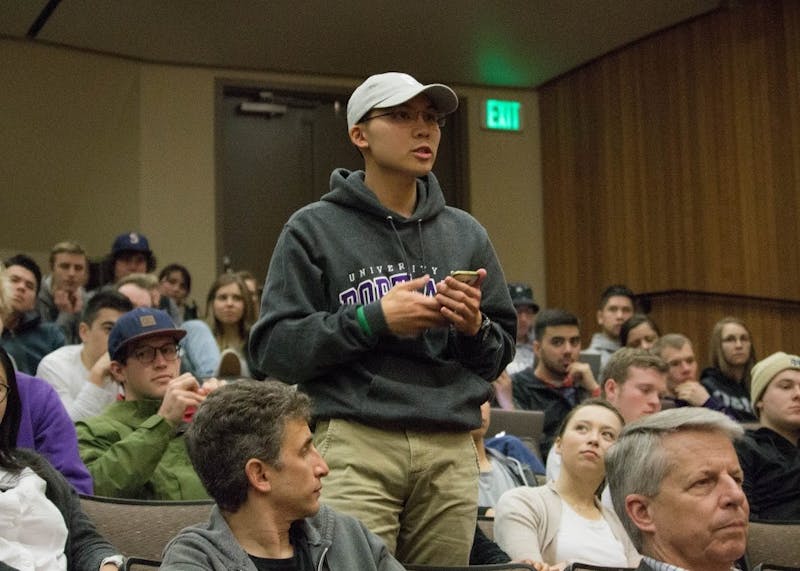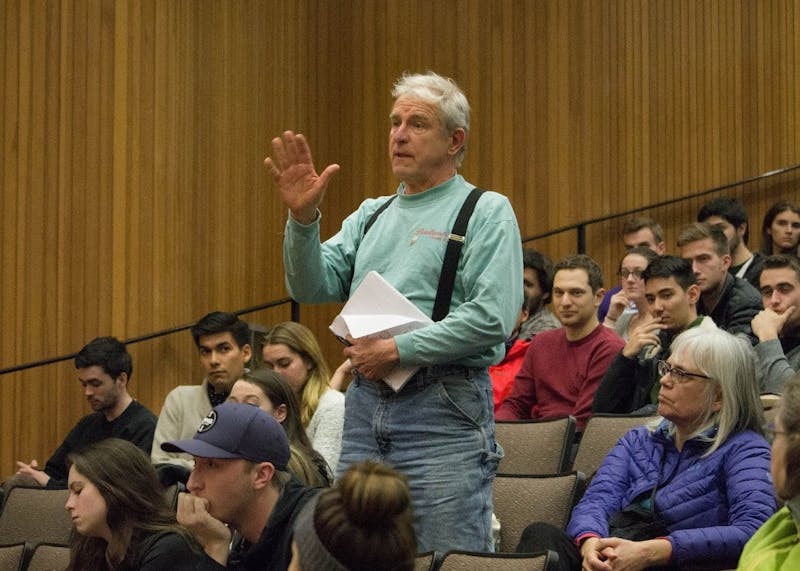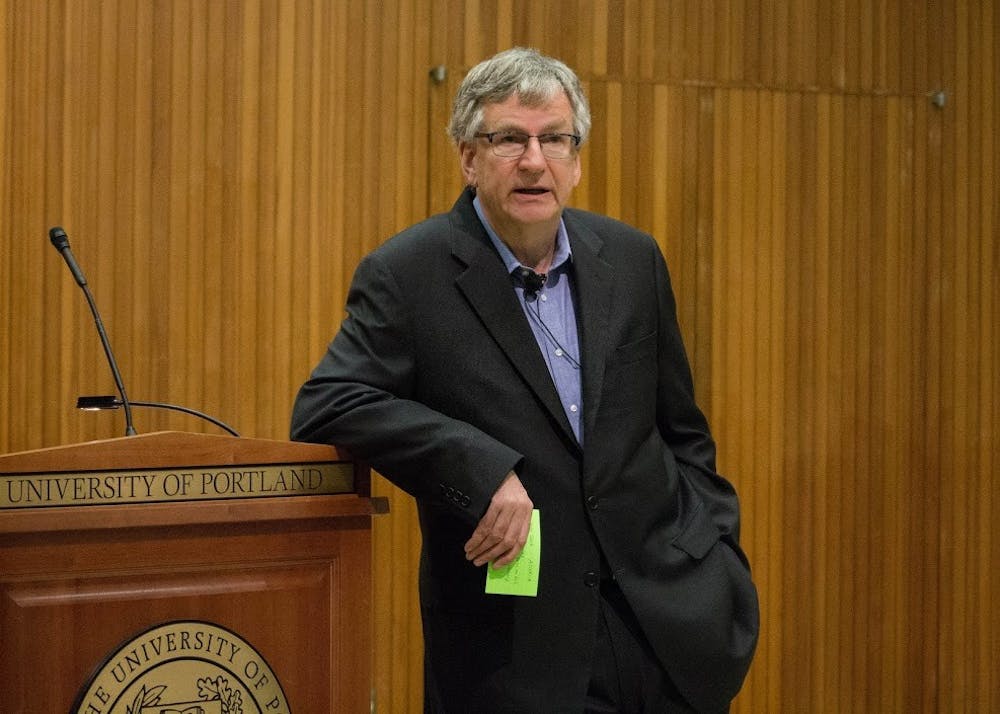The CEO of Daimler Trucks North America (DTNA) Martin Daum spoke Monday night in Buckley Auditorium on business ethics, a topic that took on added weight when some audience members asked Daum about nuisance odors they say the Daimler plant emits into the neighborhood.
Daum was invited by Dan McGinty, director of the Dundon-Berchtold Institute for Moral Formation and Applied Ethics, to speak for the institute’s first-ever ethics week. The German-born CEO focused his speech on a number of ethical areas including environmental impact, racial and religious tolerance and ethical business decision-making. He did not mention the Swan Island company’s recent controversy over nuisance odors.
This troubled members of the North Portland chapter of Neighbors for Clean Air (NCA), many of whom attended the talk.

“A really good discussion about ethics would have started with the pollution that this company is causing in this neighborhood,” said Dennis Poklikuha, who lives a few blocks from the university. “Instead he spoke for half an hour about fluff. He should have started with, ‘Hey, are you people smelling our paint?’ That would have been an ethical discussion to me.”
Daum spoke for a little under an hour and took questions for 10 minutes. He discussed Daimler’s ability to increase fuel efficiency — Daum said the company’s trucks have gone from getting five miles to the gallon to 10 in recent years — and the company’s refusal to abide by the recent presidential administration’s executive order on immigration.
The CEO’s greatest emphasis was on the importance of strong leadership qualities.
“You need, as a leader, the ability for the 180-degree turn,” Daum said. “You can’t do it too often because then people get dizzy. But you have to learn from someone else and give credit to someone else. That’s very very important.”

A 180-degree turn was exactly what both University of Portland students and North Portland neighbors asked for when Daum’s speech concluded. When McGinty announced that Daum would take “one or two questions,” senior environmental science majors Anthony Ng and Gabe Ablin had statements prepared.
Ng and Ablin both looked down at long questions pre-written on their iPhones. Ng’s question pertained to research conducted by environmental science professor Ted Eckmann and some UP students that concluded Daimler was the source of a nuisance odor in the North Portland neighborhood.
That research led Oregon's Department of Environmental Quality to reopen its investigation into complaints about Daimler's emissions last spring. The investigation is ongoing.
“A research project at the University concluded that due to the correlation between wind, direction and odor intensity, that your company was producing nuisance odors in our community,” Ng said during the event. “What does a good neighbor mean to you and how do you respond proactively?”
Daum’s response echoed the statement that Daimler Spokesman David Giroux gave The Beacon a month ago.

“I’m fully aware that this is going on,” Daum said. “We took the research seriously. We investigated thoroughly, far more than we ever investigated a complaint and we came to the conclusion that we are not the source of the odor.”
Ablin followed up, asking if there was anything the company could do to strengthen the community bond between the company, the University and the neighborhood.
“Every day when I ride my old mountain bike to work past the rows of nice Mercedes at Daimler, I see an opportunity rather than an inequality,” Ablin said.
Daum’s response appeared to frustrate several audience members. The question of strengthening Daimler’s relationship with the community largely went unanswered, and Daum further elaborated on his statement pertaining to the nuisance odor research.
“I am 100 percent convinced that if we would close the factory, we would send 800 people home and two weeks later, you would have the same odor in town that you had before because it wasn’t us,” Daum said.
Two members from the Neighbors for Clean Air were also able to ask questions. One was Poklikuha, who stressed that he has been “breathing this air for 24 years.”
“You mentioned earlier that the individual to you is more important than money,” Poklikuha said. “I’m an individual that lives as downwind from (your factory) as you can possibly get. I disagree with you that you are not the source of the smell. When Daimler is painting, my family and I have to go inside. You are one of the sources.”
Poklikuha pointed out that the Portland plant has a less advanced filtration system than Daimler plants in Germany. Daum argued that while the Portland factory — DTNA is headquartered in Portland — produces 20 trucks a day, the factory in Germany produces 600, therefore necessitates a different filtration system.

“We are never shy to talk to the neighbor, to inform, but this is the wrong forum to do so,” Daum concluded. “I am not the right person to do that. I am not the expert on day to day activity. I was not brought here tonight for a paint discussion, I was brought here to talk to you about a part of my story and I want to stop this.”
However, the discussion did not stop once the event was over. Many members of the NCA stuck around to continue the conversation with Daum.
The neighbors were eager in coming to the event, because in all their efforts to work with Daimler on improving North Portland’s air quality, they had never met Daum, who lives in Portland with his wife and two children, one of whom is a UP student.
“This is the closest we’ve come personally to Daum,” said Linda Nakashima, a member of the NCA who said she has “been trying to fight the fight” for 10 years. “I hope that he listens to us and actually takes it seriously that we really are affected up here.”
Daum became increasingly agitated as members of the NCA and Eckmann continued to ask him questions about taking Eckmann’s research, which shows different conclusions than Daimler’s internal investigation, into consideration.
“I haven’t produced a single car in my life,” Daum said in response to NCA member Adam Bartell who asked how Daum could be the CEO of Daimler, and yet claim not to be an expert on the issue of odors. “I have 220,000 people that I work with. I have stuff done by the experts of those things. So we have engineers who do nothing else, who put more resources to that tiny plant. We build more than 600 trucks every day (in Germany), we do 20 in Portland, but we put more engineering resources in Portland because we take you guys seriously.”
Daum then walked out of the auditorium without taking any further questions.
“I guess maybe Martin (Daum) had to leave,” Eckmann said. “He seemed in a hurry to get out of here. But I’m open. I want to work with them.”
Read more about the DEQ nuisance odor investigation into Daimler and Eckmann's research here.








